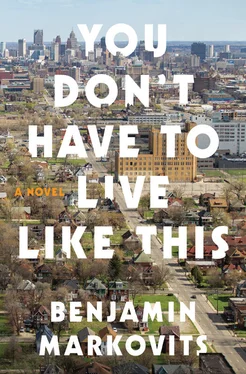We said all kinds of things to each other. One of the things I remember is that she said, “I don’t always know who I am. Isn’t that weird?”
“When do you know who you are?”
“When I’m not with you.”
But we got to sleep eventually and had a nice weekend together.
I DECIDED FOR A COUPLE of reasons to call Astrid. What Mel Hauser had said kept worrying me. It seemed that whenever I had sexual relations with people I started to get paranoid thoughts, I started to think I didn’t know these people I was sharing my bed with at all. I mean, that’s basically what Gloria had told me, that I didn’t understand her. But in this case I had third-party information that Astrid had lied and lied in a kind of spooky way. So I phoned her up and we arranged to meet after work at that bar by the train station. The bar was her idea.
It turned out to be a bad day at school. We had one week of class left, the exams were done, everybody seemed to be feeling their oats. It didn’t help that the air-conditioning broke down. Even with the windows open I could feel my shirt sticking to me and unsticking. When a breeze blew in it was like a little taste of vacation.
Since we were just killing time, I taught a few classes on colonial America — something I actually know about. This was a mistake; the kids didn’t care and I got annoyed.
One of the interesting things about the early colonies, I told them, which you don’t get much of a sense of, say, from The Scarlet Letter , is that even though the Pilgrims would probably be considered religious fundamentalists by today’s standards, they actually had to make quite a few concessions to civil liberties. They just didn’t have enough people, certainly after the first couple of winters, to keep up the old social structures.
Mabelle Johnson said, “Explain to me why I care.” She had been acting up consistently since the visit to the farm.
“Well, for example, unmarried women had the right to own property.”
“You mean ’cause I’m like an unmarried woman? What about black women? How much property did black women own?”
“I don’t know. The first blacks came to Virginia in 1619, as indentured servants. Some of them eventually owned land, but I don’t know about women. Some of them owned slaves.”
“You made that up.”
“Look,” I said. “The line between servant and slave wasn’t always easy to draw, especially at the beginning. People talked about servants in terms of money, but they also had contracts, which could be worked out.”
“What do you mean, money ?”
“I mean they left each other servants in their wills. They traded servants, they put a value on them.”
“Like how much?”
“It varied. But about twenty, twenty-five pounds.”
“How much is that?”
“In today’s money?”
“In dollars.”
“That’s hard to say, but it’s a reasonable amount of money.”
“For a black man? I’m a tell Miss Lambert you said that.”
“That’s not what I meant. We’re talking about white servants, too.”
“Why don’t you say what you mean?”
And so on. I didn’t know what to do about her; there was nothing I could do. But I felt angry for the rest of the day and didn’t get to see Gloria after school, except for three minutes in the parking lot. I told her I was going to meet an old friend for a drink.
ASTRID WAS LATE AND I sat at the bar long enough to finish a beer. Just as well, I thought, since I didn’t know how to say what I wanted to say to her. But then she came in and I couldn’t believe how nervous I felt — my heart beat unpleasantly.
She wore jeans and cowboy boots, which was like her uniform. In the air-conditioned bar her pale skin quickly goose-pimpled. “You called me,” she said.
“I wanted to ask you something. A friend of mine’s a cop, and I asked him to look into what happened to you. He told me something I wanted to ask you about.”
“I should warn you, I’m not interested in any of that anymore. I’ve talked about it so much it doesn’t feel real. And anyway, it wasn’t important. You only have to open your eyes to see that what’s happening all around you is so much worse.”
“What do you mean?”
“Everything in my art was about me. But this is boring and stupid. So I started talking to other people. It’s amazing, if you ask people things they tell you.”
We ordered bar food, but I wasn’t very hungry, I didn’t eat much. The hamburgers came and she got her fingers dirty with ketchup. Even though she rubbed her hands on paper napkins, I could see the marks they made on her white T-shirt. I picked at the fries and drank another beer. One of the things we talked about was Tyler Waites. I said I knew Sandy Brinkman, the guy whose phone got stolen; Astrid seemed interested. Afterwards, she invited me back to her place — she wanted to show me what she was working on.
There was an artists’ commune near the train station, a short row of houses that had been saved from demolition and turned into studios. People lived there, too, for a few months at a time. It was somewhere to find your feet. When a space came up, Astrid jumped at the chance. It’s more like what she was used to in Berlin, she said. Everybody shared a kitchen; you cooked together. It didn’t matter what your apartment was like. You lived for seeing friends.
It was a two-minute walk to her house, but we didn’t go to her room at first. She took me to the studio, which was in another building. I had to put up with being introduced to other people, a Belgian PhD student, who was interested in modern ruins, and a black guy from East London. They were making pakoras in the kitchen. The black guy did most of the cooking. He wore high-tops, army pants and a Mookie Blaylock jersey under his apron. I could see the name when he turned around.
“What do you do?” I said.
He recorded house parties, mostly audio recordings. Basically, he was interested in the music being played, but he also took photographs. On Friday nights he just drove around the city.
I felt like the guy who hangs around the girl and was glad when she took me upstairs. Her studio was pretty basic; it had some video equipment and a cheap two-seater couch. Astrid immediately opened both windows — the whole house smelled of frying oil. Then we sat down and watched one of her films.
“Do you want something to drink?” she said, hitting the pause button. “All I have is Jack Daniel’s.”
So she poured some into coffee mugs and started the film again. The first thing I saw was a framing shot of a playground basketball court. There was a game going on and music in the background, but you couldn’t tell if the music came from the park. Then it got louder and too loud, somebody rapped angrily—
All of my brothers live by the trigger
But nobody care so long as nigger kill nigger
— and the screen suddenly turned into a black talking face with a white wall behind it. The music stopped and you could hear him:
— I tell you something happened the other day. I went down to the park to play a little ball. Corey got next, so I said to him, can I run with you, Corey? And he’s like, you come to play? Because this little punk’s been running his mouth. I’m fixing to shut him up. And D’Andre hears him, and he’s like, yeah, shut this, and knocks down a three. Game over. You know, everybody having a good time, just talking a little shit. So we get in the game and they start going at it. Pushing and shoving. Bitching and moaning. A lot of ticky-tack calls. So I say, come on, fellas, let’s play the game, I came here to play basketball. We usually run to twenty-one, twos and threes, winner stays. And after a while it’s like nineteen up. Then D’Andre takes it to the hole, and puts up some weak shit, and I slap that shit away, and D’Andre’s like, and one . Which pisses me off now. So I say, you gotta make the bucket. It can’t be and one if you don’t make the fucking shot, and Corey’s like, man, he didn’t foul you, bitch, and everybody saying, honor the call, honor the call, and D’Andre’s like, ball up. He’s one of these skinny hyped-up guys who got like twice as big in two months, and has to wear a T-shirt all the time to cover his back. So he takes the ball out and jacks up a three, which bangs off the rim, and Corey says, ball don’t lie. Ball don’t lie. And D’Andre goes over to the benches, like he’s getting a drink. So I turn my back and run down court. And then I hear everybody saying, hey, hey, hey, watch out, and Corey’s lying on the ground. Fuck me. And D’Andre’s got a knife in his hand and is jumping up and down, and everybody says, get the fuck out of here, and he takes off.
Читать дальше












